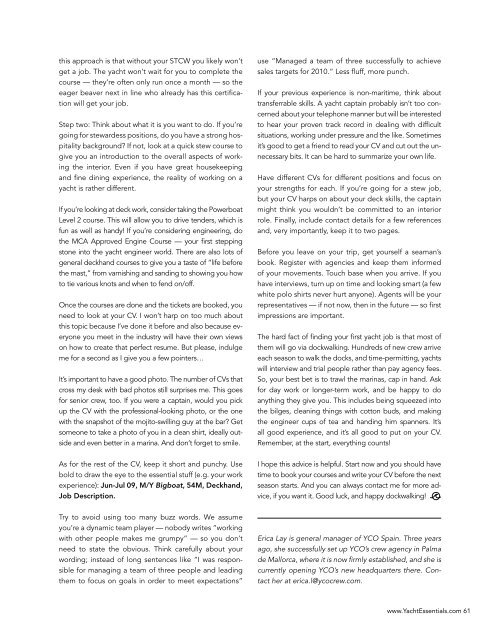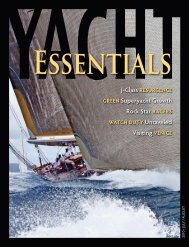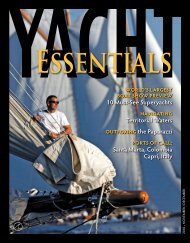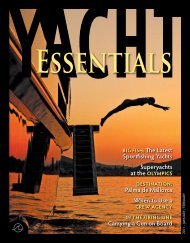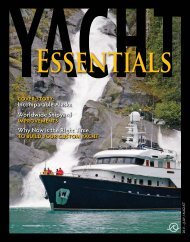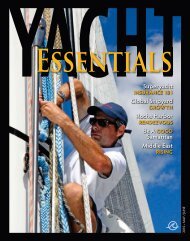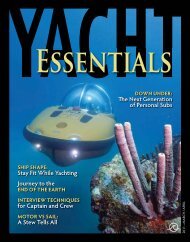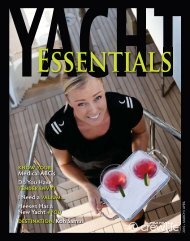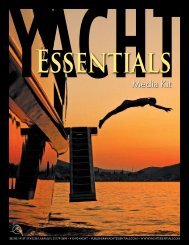photo contest - Yacht Essentials
photo contest - Yacht Essentials
photo contest - Yacht Essentials
Create successful ePaper yourself
Turn your PDF publications into a flip-book with our unique Google optimized e-Paper software.
this approach is that without your STCW you likely won’t<br />
get a job. The yacht won’t wait for you to complete the<br />
course — they’re often only run once a month — so the<br />
eager beaver next in line who already has this certification<br />
will get your job.<br />
Step two: Think about what it is you want to do. If you’re<br />
going for stewardess positions, do you have a strong hospitality<br />
background? If not, look at a quick stew course to<br />
give you an introduction to the overall aspects of working<br />
the interior. Even if you have great housekeeping<br />
and fine dining experience, the reality of working on a<br />
yacht is rather different.<br />
If you’re looking at deck work, consider taking the Powerboat<br />
Level 2 course. This will allow you to drive tenders, which is<br />
fun as well as handy! If you’re considering engineering, do<br />
the MCA Approved Engine Course — your first stepping<br />
stone into the yacht engineer world. There are also lots of<br />
general deckhand courses to give you a taste of “life before<br />
the mast,” from varnishing and sanding to showing you how<br />
to tie various knots and when to fend on/off.<br />
Once the courses are done and the tickets are booked, you<br />
need to look at your CV. I won’t harp on too much about<br />
this topic because I’ve done it before and also because everyone<br />
you meet in the industry will have their own views<br />
on how to create that perfect resume. But please, indulge<br />
me for a second as I give you a few pointers…<br />
It’s important to have a good <strong>photo</strong>. The number of CVs that<br />
cross my desk with bad <strong>photo</strong>s still surprises me. This goes<br />
for senior crew, too. If you were a captain, would you pick<br />
up the CV with the professional-looking <strong>photo</strong>, or the one<br />
with the snapshot of the mojito-swilling guy at the bar? Get<br />
someone to take a <strong>photo</strong> of you in a clean shirt, ideally outside<br />
and even better in a marina. And don’t forget to smile.<br />
As for the rest of the CV, keep it short and punchy. Use<br />
bold to draw the eye to the essential stuff (e.g. your work<br />
experience): Jun-Jul 09, M/Y Bigboat, 54M, Deckhand,<br />
Job Description.<br />
Try to avoid using too many buzz words. We assume<br />
you’re a dynamic team player — nobody writes “working<br />
with other people makes me grumpy” — so you don’t<br />
need to state the obvious. Think carefully about your<br />
wording; instead of long sentences like “I was responsible<br />
for managing a team of three people and leading<br />
them to focus on goals in order to meet expectations”<br />
use “Managed a team of three successfully to achieve<br />
sales targets for 2010.” Less fluff, more punch.<br />
If your previous experience is non-maritime, think about<br />
transferrable skills. A yacht captain probably isn’t too concerned<br />
about your telephone manner but will be interested<br />
to hear your proven track record in dealing with difficult<br />
situations, working under pressure and the like. Sometimes<br />
it’s good to get a friend to read your CV and cut out the unnecessary<br />
bits. It can be hard to summarize your own life.<br />
Have different CVs for different positions and focus on<br />
your strengths for each. If you’re going for a stew job,<br />
but your CV harps on about your deck skills, the captain<br />
might think you wouldn’t be committed to an interior<br />
role. Finally, include contact details for a few references<br />
and, very importantly, keep it to two pages.<br />
Before you leave on your trip, get yourself a seaman’s<br />
book. Register with agencies and keep them informed<br />
of your movements. Touch base when you arrive. If you<br />
have interviews, turn up on time and looking smart (a few<br />
white polo shirts never hurt anyone). Agents will be your<br />
representatives — if not now, then in the future — so first<br />
impressions are important.<br />
The hard fact of finding your first yacht job is that most of<br />
them will go via dockwalking. Hundreds of new crew arrive<br />
each season to walk the docks, and time-permitting, yachts<br />
will interview and trial people rather than pay agency fees.<br />
So, your best bet is to trawl the marinas, cap in hand. Ask<br />
for day work or longer-term work, and be happy to do<br />
anything they give you. This includes being squeezed into<br />
the bilges, cleaning things with cotton buds, and making<br />
the engineer cups of tea and handing him spanners. It’s<br />
all good experience, and it’s all good to put on your CV.<br />
Remember, at the start, everything counts!<br />
I hope this advice is helpful. Start now and you should have<br />
time to book your courses and write your CV before the next<br />
season starts. And you can always contact me for more advice,<br />
if you want it. Good luck, and happy dockwalking!<br />
Erica Lay is general manager of YCO Spain. Three years<br />
ago, she successfully set up YCO’s crew agency in Palma<br />
de Mallorca, where it is now firmly established, and she is<br />
currently opening YCO’s new headquarters there. Contact<br />
her at erica.l@ycocrew.com.<br />
www.<strong>Yacht</strong><strong>Essentials</strong>.com 61


